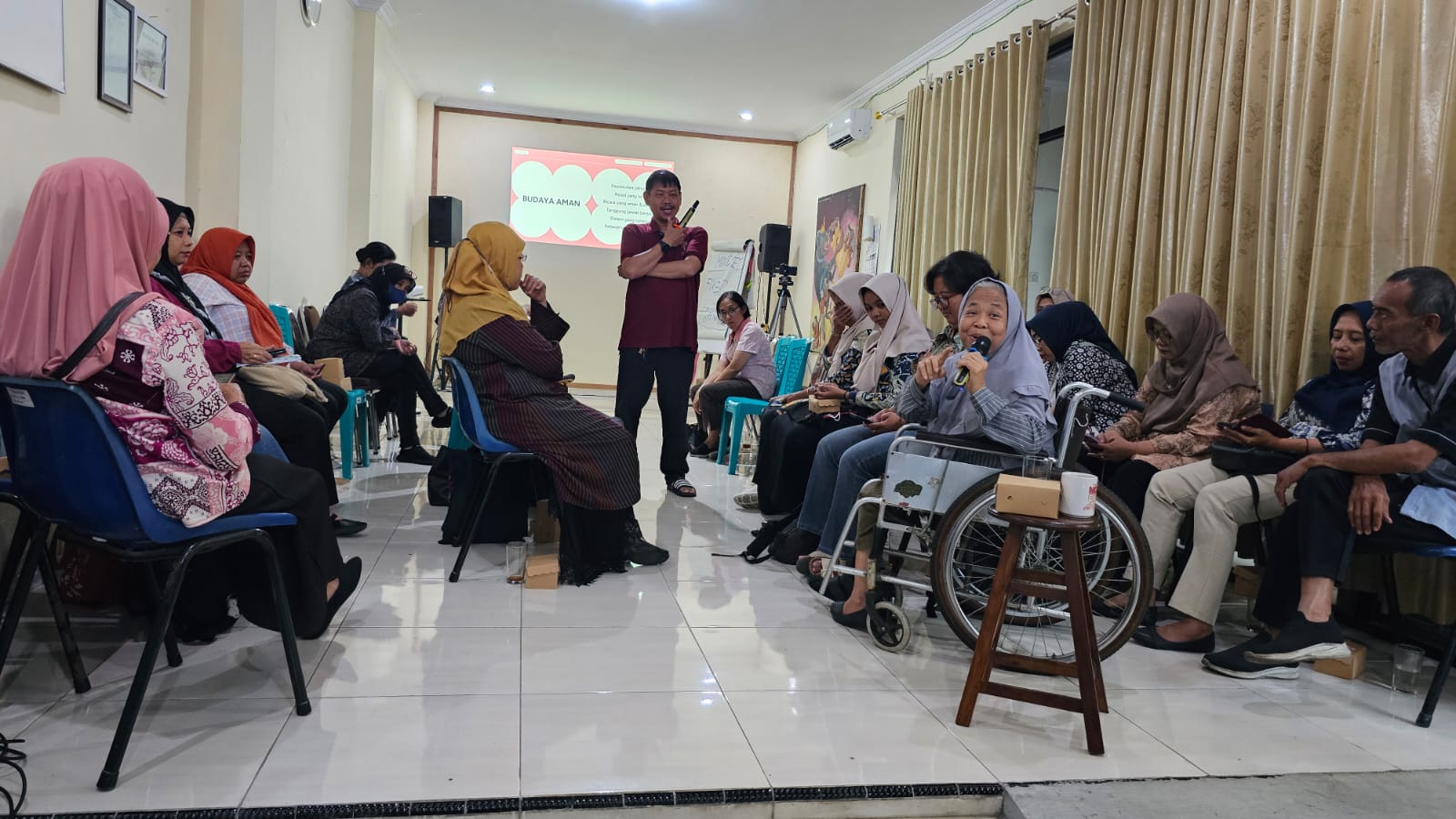“A safe self is the foundation. So start from that point - a safe self.”
“A safe self is an intuitive self, allowing us to tune into our intuition. In fact, children are sensitive. We need to listen to that intuition. When there is discomfort, when there is danger, then the assertive and proactive self come forward.”
This is the message of Father Vincentius Ernest Justin, SJ. (a lecturer at Universitas Sanata Dharma Yogyakarta and Jesuit Indonesia Safeguarding Team) during critical study discussion on“Promoting Safe Culture towards Non-Violence Spaces”organised by Civil Society Coalition for Women and Children in Surakarta (Koalisi Masyarakat Sipil Peduli Perempuan Anak Surakarta or Komasipera) - a network of individual and civil society organisations who care for women and children in collaboration with Yayasan YAPHI. The discussion takes place on Thursday (31/7) with 30 members of Komasipera at Anawim Hall, Yayasan YAPHI.
Before delving into those feelings, Father Ernest tries to internalise the key issues relating to people’s lives, to participants’ lives on a personal level, because many participants are people who deal with cases and accompany victims. Internalisation is not limited to introduction by telling others your name and your organisation, but also how you express your feelings this morning. Certainly there are many answers, from sad emotion, confused, doubtful, and happiness that half of the participants show. Many participants express their expectation to spread kindness, starting from home, and then their community and ultimately the general population. From here, the discussion moves to defining the word “Safe” participants must define for themselves: protected, free from fear, calm, peaceful, free from violence, no worry, no anxiety, enjoy, protected from something that hurt - I.e. COVID-19 virus. Then Father Ernest asks participants to discuss, and to always look whether they feel safe, whether they feel peaceful or not when relating to others, or when they relate to young people: whether the relation is toxic, whether the toxicity comes from pressures from other people they share housing with or with colleagues at work.
Then, the next question is, what can we do to give a sense of safety to women and children? How can we make women and children feel safe. There may be plenty of answers to that question, such as: by offering accompaniment, by accompanying women when they are going somewhere, by showing your love, by being a friend, by saying good things, by using nice words, by respecting differences, by understanding the environment around, by creating safe spaces, by being patient, friendly, by greetings, by maintaining physical and mental health after what happens, by protecting from violence, by preparing oneself to face risks, by praying for safety, by greeting, by good communication, by not judging women - particularly with regards to a woman’s body, by respecting and symphatising with each other.
Father Ernest then offers this “It should start from oneself”. The first thing first is: Am I safe? He reflects on himself as a lecturer who deals with students with a variety of characters - diligent, lack of discipline, or students with raised voices. A question then pops up: am I a safe person in front of my students? Then, he starts to learn communication in order to present himself as safe and comfortable. “WE will not go anywhere if we do not start from ourselves. We must look ourselves in the mirror. Are we good? Are my clothes neat? Am I a safe person? And then I need to convince myself: Am I really a safe person or not?” says Father Ernest.
Father Ernest emphasis on “I am safe” can be identified through the emotion - whether it is under control or not. “So we must regulate this, by for example talk to oneself, "Please accept me as I am". He also suggests that a person’s character can be shaped, to become a safe character even when initially it is not safe.
With regards to one’s sense of safety, it is often the case that the structure in community makes situation unsafe. Sometimes, a person has the potential to grow, but there is no supports or there is discrimination by the State that that person prefers to leave the country. So a sense of safety must become a lifestyle. “Our aura will shine when we feel safe. When we are close, we feel safe with our seniors. Certainly, there would be cynical seniors, but there would also be seniors who makes us feel safe,” says Father Ernest.
Yes, as expressed by Haryati Panca Putri, the director of Yayasan YAPHI during opening, that we must promote safe spaces for children and women. The word “safe”is key to everyone. We must create such safe spaces, and for that we must continuously work for it. The theme “Promoting Safe Culture”is not just small talk, because it is a call for everyone. Then what about the word culture? Culture develops from the smallest to the largest. It relates to physical, verbal, emotional, and cyber violence which has serious consequences to a person’s or a child’s potentials - both in private and public spheres,” says Putri. (Ast)












